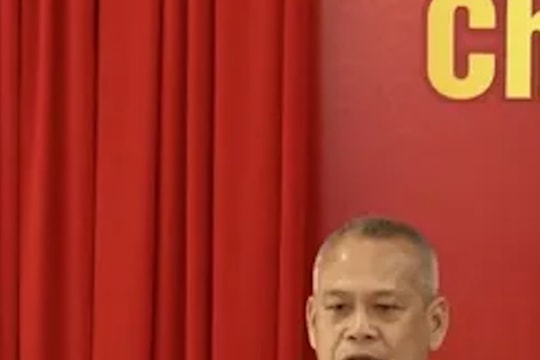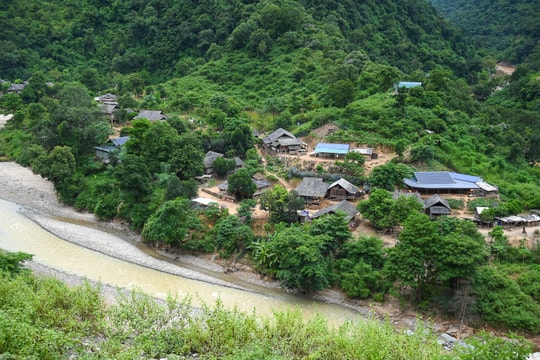Difficulty in collecting environmental sanitation fee arrears
(Baonghean) - The situation of unpaid environmental sanitation fees that cannot be recovered, many cases of intentionally not paying environmental sanitation service fees but there are no sanctions to handle, affecting the state budget and causing social injustice... These are some of the issues that Vinh city residents are concerned about.
Large debt, difficult to collect
Since 2017, the environmental sanitation fee in Vinh city has been replaced by the price of waste collection and treatment services (abbreviated as environmental sanitation fee). However, the situation of fee arrears and revenue loss is a problem for the city.
According to statistics, for non-business households (the collection level based on Decision 74/2016/QD-UBND of the Provincial People's Committee is 8,000 people/month for ward level, 6,000 VND/person/month for commune level), the whole city is short of nearly 40,000 people compared to the 2016 environmental sanitation fee (equivalent to 4 billion VND per year).
Regarding business households, the whole city has over 22,000 individual business households but the number of collecting environmental sanitation fees is low. In 2017 alone, the target of setting up a set of 3,300 households was assigned and the result was only over 2,300 households; there are 28 markets in the city with nearly 9,000 individual business households but the set of environmental sanitation service prices has not been included. The total outstanding environmental sanitation fee debt is about 9.5 billion VND, of which 2015 was 3 billion VND, 2016 was 2.6 billion VND, and 2017 service price debt was 3.9 billion VND.
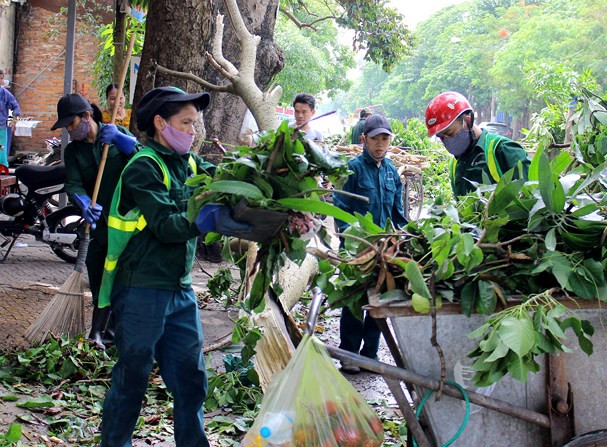 |
| Vinh City sanitation workers handle large amounts of waste every day. Photo: Quang An |
There are many reasons for the above situation, one of which is due to the current shortcomings in the establishment of the set of prices for environmental sanitation services. According to Ms. Thai Thi Thuy Giang - a specialist of the Finance - Planning Department (Vinh City People's Committee), the establishment of the set is often based on ward and commune data based on the population in the area, but the population data provided by the police and the population data often do not match, so it is difficult to finalize the data from the ward and commune. In addition, there is a "fluctuation" in population, because there is a situation where the household is there but the person does not live in the area. Or for people who stay according to regulations, after 6 months they are included in the set, but many times they only stay for a few months and then move to another place, leading to a situation where the initial set is different from the collection time.
According to Ms. To Thi Thanh - Head of the Cashier Department (Nghe An Urban Environment and Construction Joint Stock Company): The most difficult thing is to collect environmental sanitation fees from individual business households, because business households have many subjects, many levels with different collection rates. For business households established in the block (both doing business and calculating population). If the number of people is large, the fee for both business and population is added, they will not pay. If a business household has 5-6 people but they do not pay by population but pay by business, it will be lower than a household with many people but not doing business. This problem is not known how to solve, because Decision 74/2016/QD-UBND of the Provincial People's Committee regulating the maximum price for collection and transportation of household waste in Nghe An province does not clearly state this. Currently, the company is applying it itself, which means that any household with 4 people who do business will have one person deducted. However, most households do not agree.
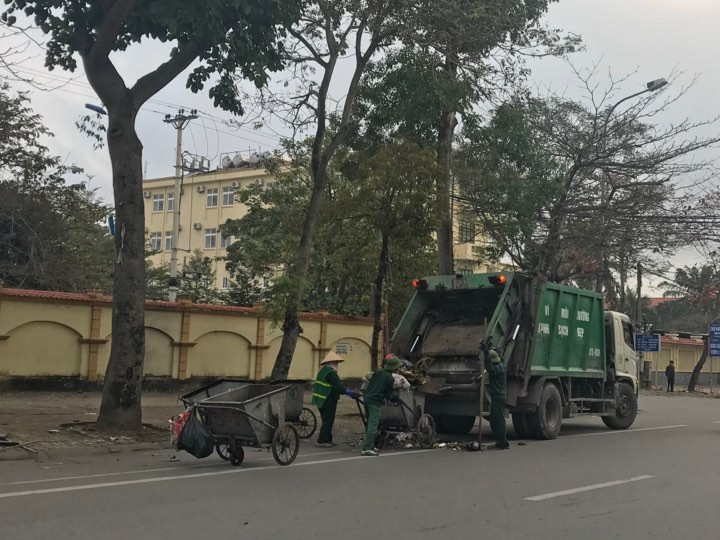 |
| Nghe An Urban Environment and Construction Joint Stock Company collects waste after Tet. Photo: Gia Huy |
As for companies and enterprises, the establishment of the price list for sanitation services is based on data provided by the Tax Department, but in reality, there are many cases where they only establish a business registration certificate to borrow capital, register a tax code to buy and sell invoices but do not operate... Besides, some companies and enterprises find enough reasons to delay, for example, they have just moved in, business is difficult... Many cases only pay half, even pay for show or intentionally do not pay. For example, they set up a price list for sanitation services at 17 - 18 million VND, but they only pay 3 - 5 million VND.
“In reality, if electricity and water users do not pay, their electricity or water will be cut off, forcing them to pay money. As for not paying for garbage collection, there is no sanction to punish them. Nghe An Urban Environment and Construction Joint Stock Company can only remind them but does not have the authority to punish. The authority to punish belongs to the People's Committees of wards and communes. There is also another solution to control garbage, but if they control one place, they will dump it elsewhere. In 2018, the Company organized 3 teams to collect outstanding debts of 43 million VND, but they paid as they paid, but did not collect according to the set price. The debt for service prices is the result of assigning targets. For example, collecting more than 24 billion VND but assigning a target of 28 billion VND, taking the target minus the collected part, there is still the debt.”
In many places, the collection of fees for domestic waste collection and transportation services in the area does not meet the annual set targets. For example, in Hung Dong commune - an area with 14 hamlets with 11,335 people, 2,654 households. In the area, there are 38 companies and enterprises with about 4,000 workers; 81 households providing production and services, 3 public schools, 12 private schools at preschool level. The results of collecting fees for annual waste collection and transportation services only reach 77 - 88%.
Explaining this, the People's Committee of Hung Dong commune said that the reason is that the locality is mainly an agricultural commune, with many families in difficult circumstances, and the number of children of working age working far away, which fluctuates frequently. The awareness of some cadres, party members and people sometimes and in some places has not seriously complied with the Party's policies and the State's laws, including the target of collecting environmental sanitation fees. On the other hand, the units of the hamlet often carry out the collection at the same time as the collection of tax obligations, so the collection is difficult...
What is the solution?
To avoid the situation of revenue loss and uncollectible environmental sanitation fee arrears, on October 1, 2018, Vinh City People's Committee issued Decision No. 5779/QD-UBND on establishing an inspection team to review the work of establishing a collection system and organizing the collection of environmental sanitation service prices in 2017 and 2018 in the city. At the same time, the People's Committees of wards and communes were requested to report population data at the times of March 30, 2017 and March 30, 2018 and the amount collected in 2017 and 2018 of each block and hamlet in the area; Vinh City Tax Department reported the list of individual enterprises located in the area; The City Statistics Office updated statistics on the number of agencies, units and business households present in each ward and commune to serve as a basis for establishing a collection system for environmental sanitation service prices.
Many opinions say that it is necessary to do a good job of reviewing and classifying each subject that must pay the fee specifically before establishing the set to ensure that people pay correctly and fully and the State also collects correctly and fully. At the same time, strictly handle individuals and units that intentionally delay paying or do not pay the fee; include the collection and payment of environmental sanitation fees in the emulation evaluation content of ward and commune units; consider families and cultural villages.
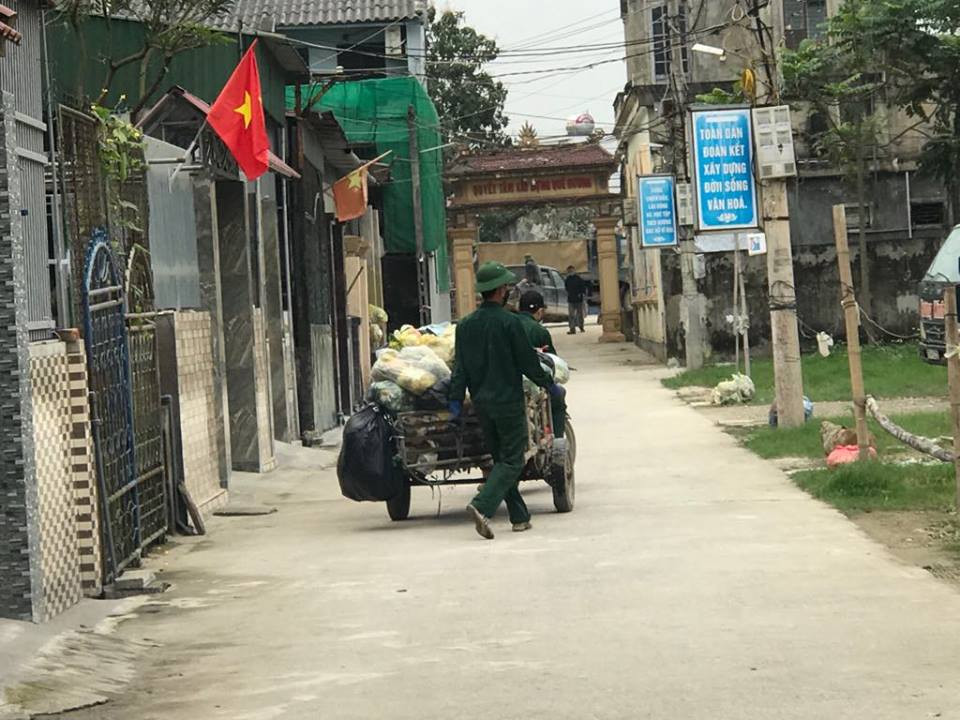 |
| Sanitation workers collect garbage at Chau Hung block, Vinh Tan ward (Vinh city). Photo: GH |
“The upcoming direction when establishing the set of prices for environmental sanitation services will require public posting at the cultural house of the neighborhood so that people can compare and review, thereby promptly recording opinions for appropriate additions and adjustments. At the same time, each collected fee will be made public, and any family that has not yet paid will be made public at the cultural house and the neighborhood loudspeaker for people to monitor.For some markets managed by the ward People's Committee, some markets under the cooperatives, previously they agreed to collect garbage with business households and signed directly with Nghe An Urban Environment and Construction Joint Stock Company to collect garbage, now they are also reviewing and putting it into the common set.
Another important solution is to step up propaganda work so that people understand that paying sanitation fees is an obligation and responsibility, contributing to creating a source of revenue to pay for the collection and treatment of household waste, protecting the environment, gradually forming a cultural and civilized urban lifestyle, building a green, clean and beautiful city.




